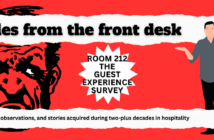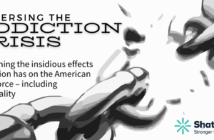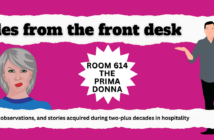Hotels’ enhanced cleaning standards and messaging are winning over core customers
by NICK FORTUNA
Even with travel at historically low levels this past year, hoteliers have earned consumers’ trust through their steadfast commitment to cleaning, sanitization, and communication. That’s positive feedback from Dave Hilfman, interim Executive Director of the Global Business Travel Association, who praised major hotel groups for being quick to react to the pandemic and enhancing their cleaning and safety procedures.
The GBTA, an Alexandria, VA-based group representing about 9,000 business-travel professionals around the world, has polled its members about industry issues throughout the pandemic, Hilfman said.
One recent survey asked them to judge the effectiveness of safety campaigns across different supplier types, and 78 percent of respondents said hotels’ campaigns had been effective or very effective, illustrating a high level of confidence in hotels’ cleaning standards.
“We applaud the hotel industry worldwide for the significant investments made to enhance the overall customer experience for business travelers, especially when it comes to safety and security,” Hilfman said.
In a separate survey, the GBTA asked members to identify five ways hotels could address concerns about health and safety, and the top answer, cited by 79 percent of respondents, was to increase their cleaning standards. That was followed by requiring employees to wear masks (58 percent), providing additional staff training about COVID-19 sanitary practices and incident reporting (55 percent), requiring guests to wear masks in common areas (47 percent), and providing guests with safety information about their hotel stay (44 percent).
Other suggested actions for hotels included enforcing physical-distancing guidelines (38 percent), installing signs to remind guests and employees of best sanitation practices (37 percent), providing masks to guests (22 percent), and having housekeeping visit rooms only when requested by guests, thereby reducing the likelihood of viral transmission (21 percent).
PROVIDING TRANSPARENCY
The survey results show that travelers want to know what hotels are doing to keep them safe, and leading hotel brands are granting that transparency. Last May, Radisson Hotel Group launched its safety protocol program, featuring a 20-step protocol for hotels and a 10-step protocol for meeting and event spaces.
Radisson set up a website to give guests a detailed look at the precautions it put in place. A pair of 90-second animated videos walks viewers through a wide range of initiatives, including providing more individually wrapped grab-and-go food options, checking the temperature of employees and vendors, locking or removing minibars, providing a clean and disinfected television remote control in a sealed protective bag, and providing each guest room with a travel-size bottle of hand sanitizer.
The cleanliness and disinfection protocols were developed in partnership with the Swiss multinational giant SGS, the world’s leading inspection, verification, testing, and certification company, according to Stacy Brindise, Radisson’s Senior Director for Guest Experience, Operations, and Hotel Integration in the Americas.
G6 Hospitality has its own mission to provide sanitization comfort to its guests – the Clean@6 initiative. “Our mission remains consistent – to provide safe, clean, and comfortable accommodations,” Rob Palleschi, CEO of g6 Hospitality said. “As the travel industry begins its road to recovery, it is incumbent on all hoteliers to continue being transparent and communicate with consumers to help guide their decision on where to stay.”
“Radisson is marketing its safety protocols to guests in a variety of ways, Brindise said. Hotels that have passed a comprehensive local audit through SGS can display the Radisson Hotels Safety Protocol label onsite, on their individual hotel websites, and on each hotel’s Google My Business listing, she said. Additionally, a message regarding the company’s health and safety protocols is added to each certified hotel’s TripAdvisor listing.
“Our marketing team has also utilized social-media, paid-search and video-streaming ads to make guests aware of the advanced safety measures being implemented at our hotels,” Brindise said. “These marketing efforts have been effective in reaching and engaging with our guests who are traveling during this time. We have found that listing all our protocols and precautions on our website to help ensure our guests’ health and safety is particularly important and helpful to travelers as they research and plan their trips.”
Prior to arrival, Radisson guests receive an email with information outlining the company’s health and safety protocols. Hotels use signage to communicate the new protocols to guests, including physical-distancing floor decals, mask-requirement posters and lobby posters illustrating the safety protocols.
As part of the check-in process, front-desk agents inform guests about Radisson’s protocols, and when guests get to their room, there is a door hanger with a QR code that provides details on the hotel’s cleaning procedures.
“Our hotel teams have received positive feedback from guests as they are thoroughly informed about our safety protocols and cleaning and sanitation process throughout their hotel stay,” Brindise said.
EXPLORING TECH SOLUTIONS
With COVID-19 sure to linger a while, some hotel companies are turning to technology to curb viral spread. By limiting the number of interactions between guests and workers and reducing the usage of high-touch surfaces, hotels can decrease the risk of transmission.
Some tech solutions that have emerged in recent years could see rapid uptake, including keyless room entry using smartphone apps, voice-activated controls in guest rooms for lights, air conditioning, and the TV, and robots that deliver room service and other essentials to guests.
“Touchless technology plays a key part in this area,” Hilfman of the GBTA said.
Radisson is running pilot programs to test new technology and hopes to begin implementation at hotels soon, Brindise said, declining to provide further details.
“We are waiting to officially announce any of these measures until we have successfully completed the pilot, gathered all our research, and have determined the appropriate next steps,” she said.
THE NEW OFFICE SPACE
Microsoft co-founder Bill Gates made headlines in mid-November when he predicted that global business travel would be halved and the number of days the typical employee spends in the office would decline 30 percent in the years following the pandemic. Technological advances such as online video conferencing have made it easy to work from home and to collaborate with partners around the world, he said.
A sharp reduction in business travel obviously would be bad news for hoteliers. But Hilfman said the work-from-home movement could allow hotels to serve as flexible office or meeting space as companies downsize their permanent office footprints.
“With so many people now working from home, hotels are well positioned to fulfill this alternative,” he said.




